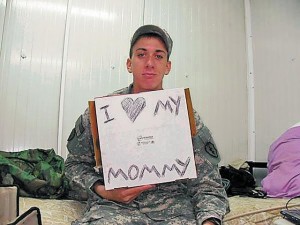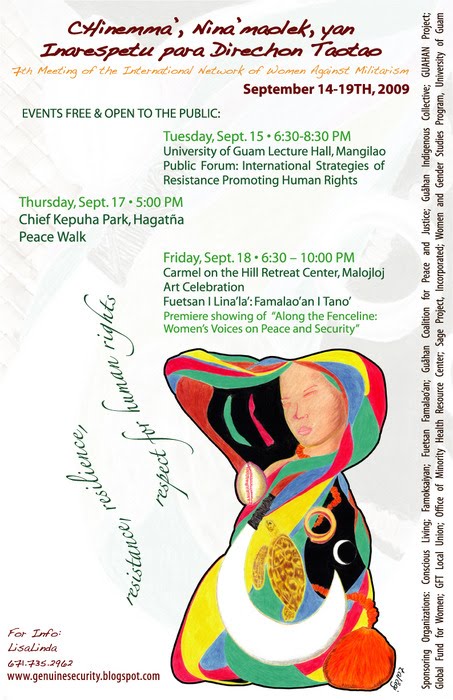Solidarity Statement from the Members of the Network for Okinawa
http://closethebase.org/2010/04/22/solidarity-statement-from-the-members-of-the-network-for-okinawa/
Solidarity Statement from the Members of the Network for Okinawa
April 25, 2010
Network for Okinawa
We, the members of the Network for Okinawa, represent many hundreds of thousands of Americans and people around the world who support democracy and environmental protection in Okinawa. Our grassroots network draws together representatives from U.S. and international peace groups, environmental organizations, faith-based organizations, academia, and think tanks.
Today we proudly announce our stand with the governor, the mayors, the media, the Henoko village elders, and the one million citizens of Okinawa; the thirty thousand residents of Tokunoshima, and the hundreds of thousands of citizens across Japan who support Okinawa. From across the Pacific Ocean, we support their demand for the closure of the Futenma U.S. Marine Base and opposition to any new military base construction in Okinawa and Tokunoshima Island.
We appeal to Prime Minister Hatoyama to keep his promise to the Okinawan people and honor their rejection of any new construction in Camp Schwab. This includes a proposal to build a runway within the base already rejected in the 1990’s. The mayor of Nago, Inamine Susumu reiterated this rejection this year. We also ask Prime Minister Hatoyama to reject the U.S.-Japan 2006 proposal to construct partially offshore runways. This expansion would destroy the coral reef which is the home to the Okinawan dugong, blue coral, and other species, It would damage beautiful Yanbaru Forest, home of many beautiful animals and plants, including endangered species.
We call upon President Obama, as the commander-in-chief of the U.S. military, to honor the Okinawan democratic decision to remove the U.S. Futenma Marine base out of their prefecture and their call for no further U.S. military base construction.
The U.S. military built its first military bases during the Battle of Okinawa to serve as a platform for an invasion into Japan, then ruled by an imperial militarist wartime regime. Over two hundred thousand Okinawan civilians, American soldiers, and Japanese soldiers died in the crossfire between the U.S. and Japan in that battle. It was the bloodiest in the Pacific War.
But the war’s end did not bring peace to Okinawa. The U.S. never dismantled its military bases and began to use them under its own Cold War military regime with a never-ending succession of enemies: Korea, Vietnam, Laos, China and the Soviet Union. Some U.S. and Japanese officials again imagine China a threat—despite détente and ever-increasing economic integration between China and the U.S., Japan, South Korea, Australia, and other nations that deems war very unlikely.
Former Okinawan governor Masahide Ota stated—that for Okinawans—the war never ended. Many Okinawans still experience anxiety and depression from wartime trauma. The remains of 4,000-5,000 dead Okinawans have yet to be collected. Unexploded bombs remain throughout the island. Over 5,000 Okinawans have been the victims of crimes committed by American soldiers. Mr. Ota, therefore, asks: “Why shall we start preparing for a new war, while the old war is not over yet?”
Network member Peter Galvin, Conservation Director of the Center for Biological Diversity states, “Destroying the environmental and social well-being of an area, even in the name of ‘national or global security,’ is itself like actively waging warfare against nature and human communities.”
The US government has repeatedly promised reform in Okinawa. The 1972 “reversion” of Okinawa from the U.S. to Japan did not result in promised demilitarization. Their latest proposal—first made in 1996 and renegotiated in 2006—does not “lighten a burden.” It instead would move U.S. military pollution, noise, and assaults from Ginowan City to untouched Henoko.
How many elections, resolutions, and mass-scale rallies does the Japanese government and US government need before they hear the message of the Okinawan people?
We, the many people in the U.S. and worldwide, of the Network for Okinawa–hear and support these messages for removal, not relocation of military bases from Okinawa.
To illustrate, we would like to share some individual remarks from our supporters:
Gavan McCormack, Australian National University professor states, “An alliance that treats the opinion of Okinawans with such contempt is not an alliance of or for democracy. The ‘free world’ used to be fiercely critical of Moscow for trampling on the opinions of Poles, Czechs, and Hungarians; now, in the name of ‘freedom,’ it is about to act in precisely the same way. Does freedom mean so little to those who pretend they defend it?”
John Lindsay-Poland, Director of Fellowship of Reconciliation’s Latin America program, states: “Military bases in Japan and other countries are material projections of the will of the U.S. to use war and violent force. War is not only brutal, unjust, and ecologically devastating, but unnecessary to achieve legitimate aims.”
Kyle Kajihiro, Program Director, American Friends Service Committee – Hawai’i Area Office, states: “The powerful Okinawan demand is clear: peace is a human right. The Okinawan people are an inspiration to our own movement. We stand with them in solidarity for peace across the Pacific.”
In a speech she gave in Stockholm, Japanese Canadian author Joy Kogawa paid tribute to Okinawa’s peace-loving traditional culture that honors the sanctity of life:
“There is a certain small island in the east, where the world’s longest living and intensely peaceable people live.
“My brother, a retired Episcopalian priest, was in Okinawa for a few years in the 1990’s. He told me that in 1815, Captain Basil Hall of the British navy steamed into Naha, Okinawa and was amazed at what he found. The story goes, that on his way back to England, he dropped in to the island of St. Helena and had a chat with Napoleon.
“’I have been to an island of peace,’ the captain reported. ‘The island has no soldiers and no weapons.’
“’No weapons? Oh, but there must be a few swords around,’ Napoleon remarked.
“’No. Even the swords have been embargoed by the king.’
“Napoleon, we’re told, was astonished. ‘No soldiers, no weapons, no swords! It must be heaven.’
“A unique culture of peace had developed in one tiny part of our warring planet…
“When Japan, that once warring nation, took over the kingdom, there was an entirely bloodless coup. No soldiers were found to help later with the invasion of Korea. A disobedient people, Japan concluded. A kingdom without soldiers was clearly impossible. Okinawa, with its history of peace, must surely have had a culture as close to heaven as this planet has managed. And perhaps therefore a special target for the forces of hate.”
Today our world stands at a crossroads between survival and self-destruction. We must transform from a world dominated by a culture of war into a world led by cooperation and nonviolent conflict resolution. Instead of forcing more unwanted military violence upon this peaceful island, the U.S. and Japan would be wise to model Okinawa’s democratic culture of life.
CONTACT: John Feffer, Institute for Policy Studies
johnf@ips-dc.org, 202-234-9382, cell: 510-282-8983
===============================================
連帯声明
2010年4月25日
Network for Okinawa
我々、Network for Okinawa(沖縄のためのネットワーク)のメンバーは、沖縄の民主主義と環境保護を支持する何十万人もの米国人と世界中の人々を代表する。我々の草の 根のネットワークは、米国と世界の平和・環境団体、宗教的奉仕活動団体、大学・研究機 関やシンクタンクの代表者を結びつける。
我々は今日、沖縄を支持する県知事、市町村長、メディア、辺野古のお年寄りたち、100万人の沖縄県民、3万人の徳之島住民、そ して日本全国何十万人にもおよぶ国民と共にあることを、誇りを持って宣言する。太平洋を経た地より、彼らの米軍普天間基地の閉鎖と沖 縄そして徳之島におけるいかなる新たな基地建設への反対の要求を支持する。
我々は鳩山首相に、沖縄県民との約束を果たし、キャンプシュワブの新たな基地建設を拒否する彼らの意志を尊重するよう要請する。 これには基地内に滑走路を建設するという、1990年代すでに拒否された提案も含まれる。名護市の稲嶺進市長は今年、沖縄 県民のこの意志表示を繰り返した。
更に、我々は鳩山首相に、部分的に岸から離れた滑走路を建設するという2006年の日米提案を拒否することも要請する。こ のような基地の拡大は沖縄のジュゴンやアオサンゴなどが棲むサンゴ礁を破壊し、絶滅の危機にある動植物を含めた多くの美しい生物が生 息するやんばるの森をも破壊することになる。
我々は米軍の最高司令官であるオバマ大統領に対して、沖縄から米軍普天間基地を取り除きたいという県民の民主的決断と、県 内における一切の新たな基地建設に反対するという彼らの意志を尊重するよう求める。
米軍は沖縄戦中、当時軍事帝国主義によって統治されていた本土を侵略する足がかりとして沖縄に最初の基地を建設した。20万人以 上の沖縄市民、米軍兵士そして日本軍兵士がこの戦いで命を落とした。これは太平洋戦争の中でも、最も残酷な戦闘であった。
しかし終戦は沖縄に平和をもたらさなかった。米国はいっこうに基地を解体しようとせず、朝鮮・ベトナム・ラオス・中国・ソ連など次 々と「敵」をつくり出しながら冷戦における軍事政策のもとに沖縄の基地を使い始めたのだ。緊張緩和や日・中・米・韓・豪な どの経済統合がかつてないほど進んでいるにも関わらず、日米の政府関係者の中には中国を再び「脅威」と想定する者がいる。
沖縄元県知事の太田昌秀氏は、沖縄の市民にとって戦争は決して終わらなかったと言った。沖縄県民の多くが今でも戦時中のトラウマ による不安とうつに悩まされている。
四千から五千の沖縄人の遺体が未だに回収されていない。沖縄全土に渡り不発弾も残っている。そして五千人以上の沖縄市民が米兵に よる犯罪の犠牲となっている。「前の戦争がまだ終わっていないのに、なぜ次の戦争を始める準備をしなければならないのか」と 太田氏は問う。
Network for Okinawaのメンバーであるピーター・ギャルビンは生物多様性センターの保全所長でもある。彼は「た とえ『国家や世界の安全保障のため』という名目であっても、ある地域の環境や社会福祉を損なうということはそれ自体、自然と人間社会 に戦争を仕掛けるようなものだ」と言う。
米国政府は沖縄での改革を繰り返し約束してきた。1972年の米国から日本への『復帰』は約束されていた非軍事化にはつながらなかった。1996年 に作られ、2006年に再協議された最新の提案は、沖縄の「負 担軽減」にはならなかった。むしろ、米軍基地による汚染、騒音、暴力などの問題を宜野湾市から手つかずの辺野古へ移すだけとなった。
沖縄の人々の声が日本と米国政府に届くには、いったい、幾つもの選挙や決議、大規模なデモを行う必要があるのだろうか。
我々Network for Okinawaに所属する多くの米国と世界各地の人々には沖縄の声が聞こえる。我々は単に基地を県内移設させ るのでなく、沖縄から取り除きたいという県民のメッセージを支持する。
これを例証するために、我々支持者の声をここにいくつか紹介する:
オーストラリア国立大学教授のギャバン・マコーマック氏は、「沖縄県民の意志をこのような侮辱でもって対処するような同盟は民主的 でもなければ民主主義のためでもない。かつて『自由主義陣営』はポーランド人、チェコ人、ハンガリー人の意志を踏みにじったソ連政府 に対して極めて批判的であった。ところが今、『自由』の名において全く同じことをしようとしている。自由を守るふりをする者たちにとって、自由はこんなに も少しの意味しか持たないのだろ うか。」と話す。
友和会ラテンアメリカ・プログラムの責任者ジョン・リンゼイ・ポーランド氏は「日本やその他の国々にある米軍基地は、戦争を起こ し武力を行使するというアメリカの意志を反映している。戦争は非人間的で不正義で環境破壊をするにすぎず、正当な目的を達成するため には不必要である。」と述べている。
米国フレンズ奉仕団ハワイ地域事務局のプログラム・ディレクター、カイル・カジヒロ氏は「沖縄県民の力強い要求は明らだ。平和は 人権である。沖縄の人々は私たち自身の運動にインスピレーションを与えてくれる。太平洋をまたがる平和への連帯のもと、私 たちは沖縄の人々を支持する。」
日系カナダ人の執筆家ジョイ・コガワはストックホルムでのスピーチで、命の尊厳を大事にするという、沖縄の平和を愛す る伝統文化を称えた:
「東方にある小さな島があります。そこには世界一の長寿で、ものすごく穏やかな人々が住んでいるんです。」
「私の兄は退職する前に聖公会の牧師として1990年代の何年かを沖縄で過ごしました。その兄が教えてくれたのですが、1815 年に英国海軍のバジル・ホール艦長が沖縄の那覇に突入していった時、大変驚きの発見をしたのです。イングランドへの帰途、艦 長はセント・ヘレナ島に立ち寄り、ナポレオンとおしゃべりをしました。」
「私は平和の島に行ったことがある」と報告する艦長。「その島には兵隊もいなければ武器もないのだ。」
「武器がない?でも剣の2、3本はあったんじゃないのかね」とナポレオン。
「いや。剣でさえ国王が禁止している」
ナポレオンはびっくり仰天。「兵隊も武器も剣もない!そりゃ天国に違いない」
「平和の文化は戦争の絶えないこの地球の、ちっぽけな島で発展したのです・・・」
「かつて戦争中だった日本がこの王国を占領したとき、全く血を見ないクーデターが起こりました。また後々朝鮮半島を侵略するときに 手を貸したいという戦士も見つかりませんでした。日本は、この島の人々は反抗的だと結論付けました。兵隊のない王国など明 らかに不可能でした。このような平和の歴史を持つ沖縄は、きっと地球上で一番天国に近い文化を持つ場所だったのでしょう。もしかすると、それが故に、この 島は憎しみの部隊にとって特別な標的となっ たのかもしれません」
今日、我々の世界は生き残りか自己破壊の境目にある。我々は戦争の文化に蝕ばまれた世界を、お互いに協力し合い、暴力によらない 紛争を解決する世界へと変革しなければならない。この平和的な島に不必要な軍事暴力を押しけるのでなく、米国と日本は沖縄の命を尊ぶ 民主的な文化から学ぶべきである。
CONTACT: John Feffer, Institute for Policy Studies
johnf@ips-dc.org , 202-234-9382, cell: 510-282-8983












